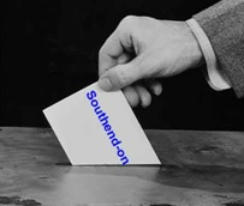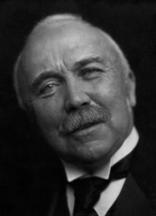Southend Politics

Southend-on-Sea
Southend's Past General Election Results
Starting
in
1885,
when
Southend
for
the
first
time
was
represented
by
a
Member
of
Parliament,
we
look
back
at
the
way
the
electorate voted.
Southend Timeline Southend-on-Sea © 2009 - 2024. All Rights Reserved
The Day Southend Voted Liberal
Since
1885
Southend
was
always
a
Conservative
styled
town;
but
a
change
was
in
the
air
during
the
1906
General
Election
held
in
January, and for one single time in the history of the town, the electorate decided to change colour.
Representing
the
South
East
Essex
constituency
covering
a
large
area
of
land
with
Southend
at
its
centre
a
certain
Mr
Rowland
Whitehead
charged
into
parliament
with
a
landslide
of
just
over
2,000
votes
representing
the
Liberal
party.
So
significant
was
this
change,
the
town
celebrated
with
a
torchlight
procession
through
the
streets.
All
subsequent
elections,
however,
would
return
to
a
Conservative
hold
right
up until today.
Significantly
in
1906
a
Liberal
MP
in
the
South
East
Essex
constituency
needed
to
get
in
to
assist
the
national
trend
which
also
elected
a
Liberal
Prime
Minster,
Sir
Henry
Campbell-Bannerman.
The
key
issue
for
the
country
would
be
around
affordable
food,
therefore
a
common
statement
being
used
by
the
politicians
nationally
was
'Big
Loaf,
Little
Loaf'.
Southend's
major
industry
at
the
time
was
fishing
and
making
this
an
affordable
commodity
was
paramount,
a
large
number
of
the
men
in
the
town
worked
on
the
fleet
around
the
coastline
from
Leigh
to
Shoebury,
this
had
a
major
influence
on
the
balance
of
power
in
the
town.
The
Liberal
policies
under
a
'Free
Fooder'
manifesto
worked
well
for
the
fishermen,
and
it
would
be
a
brave
fellow
that
voted
in
the
traditional
way
for
the
Conservatives.
However,
to
the
west
of
the
town
in
Leigh
a
strong
vote
was
cast
in
favour
of
the
Blues,
which
was
provided
by
the
many
city
workers.
The
stage
was set for one of the toughest electoral battles in the town.
The Election
In
1906
the
method
of
gathering
votes
from
Southend
was
not
as
arduous
as
it
is
today.
Southend
then
had
a
mere
three
polling
stations,
the
East
Ward
was
served
by
the
Technical
School;
West
Ward,
Leigh
Road
School;
North
Ward,
Brewery
Road
Schools.
The
shift
for
the
pollsters
was
long,
and
they
laboured
until
8pm
some
seemingly
very
tired
when
the
polls
closed.
Mr
and
Mrs
Whitehead
toured
the
polling
stations
and
where
ever
they
went
received
a
rousing
reception,
even
in
Leigh.
The
western
part
of
the
town
notorious
in
previous
elections
for
voting
blue
were
trying
hard
all
day
to
stem
the
flow
of
the
orange
vote,
and
the
polls
needed
to
wait
for
the
returning
workers
from
London
to
complete
the
count.
The
fishermen
of
the
town
invariably
voted
Liberal
and
throughout
the
day
had
maintained
a
2-1
vote
for
Liberal,
it
was
thought
once
the
city
men
had
arrived
back
the
swing
would
go
back
to
the
Tories,
alas
a
mixture
of
votes
were
returned
and
mixed
in
with
the
late
flow
of
fishing
votes
too
ensured
Capt
Newman
the
Tory candidate would not be standing for the South East Essex Ward.
Declaration
Crowds,
estimated
at
5,000,
gathered
into
Clarence
Road,
and
Clarence
Street,
outside
the
Institute
to
hear
the
declaration
by
the
returning
officer.
Police
formed
a
suitable
human
barrier
at
the
base
of
the
steps,
led
by
Superintendent
Pryke.
The
buildings
opposite
the
Municipal
Offices
and
the
Liberal
Club
had
balconies
packed
with
people
eager
to
find
out
the
result,
on
one
stood
the
ladies
of
the
Liberal
Club
including
Mrs
Ethel
Whitehead
who
acknowledged
the
crowd
with
a
smile
whenever
the
cheer
was
directed
in
favour
of
her
husband.
The
result
took
a
very
long
time,
12.45
pm
was
promised
but
this
came
and
went,
when
2pm
arrived
Liberal
Officers
appeared
at
the
windows
of
the
council
offices
with
big
smiles
giving
the
crowd
an
early
indication
of
which
way
the
result would go. Soon however, with the waving of a red handkerchief it became apparent the result was looming, a Liberal supporter
hung
out
from
a
window
waving
orange
ribbons
and
the
crowd
started
to
cheer,
with
some
supporting
the
opponents
hooting.
The
crowd's
expectations
were
borne
out
by
the
actual
result.
The
two
candidates,
with
the
Sheriff
(Mr
T.
F.
V.
Buxton)
and
the
Under
Sheriff
(Mr
C.
B.
O.
Gepp),
made
their
appearance
on
the
steps,
and
their
arrival
was
welcomed
with
another
loud
cheer
and
applause.
The
Sheriff
appealed
for
silence,
but
his
words
had
little
or
no
effect,
and
he
had
to
declare
the
result
amid
a
roar
of
voices.
The
mere
mention
of
Mr
Whitehead's
name
was
the
signal
for
the
renewal
of
the
display
of
enthusiasm
and
figures
at
that
time
did
not
concern
the
crowd.
They
only
wished
to
know
definitely
that
their
candidate
had
won.
The
actual
result
stood
as
follows:
Whitehead (Lib): 9,230, Newman (Con): 7,170. Majority: 2,060.
Torchlight Procession
The
Liberals
that
had
brought
a
new
champion
to
represent
the
town
would
spend
the
night
celebrating
the
victory.
The
first
item
in
the
programme
was
a
torchlight
procession.
The
starting
point
for
that
was
the
Tram
Terminus,
Leigh.
Preparations
commenced
before
7pm
and
motor
cars,
carriages,
bicycles,
and
pedestrians
began
to
arrive
in
force,
the
Southend
Town
Band
were
ready
to
lead,
and
so
they
went
off
down
the
hill
to
fetch
the
victor.
They
paraded
in
the
lower
town,
going
along
the
streets
on
both
sides
of
the
line.
Mr
Whitehead
arrived
by
the
7.28pm
train
and
accorded
a
hearty
welcome.
A
procession
was
formed,
headed
by
the
band
and
large
crowd,
including
a
number
of
torch-bearers,
marched
to
the
top
of
the
hill;
the
band
meanwhile
playing
"See
the
conquering
hero
comes."
On
their
arrival
there
was
an
outburst
of
enthusiasm
and
the
roadway
was
densely
crowded.
The
band
made
their
way
to
the
brake,
they
were
to
occupy
and
preparations
for
the
starting
of
the
procession
were
soon
made.
The
motorcars,
carriages
and
pedestrians
were
now
present
in
force,
it
says
much
for
the
arrangements
made
by
the
organisers
and
police
that
everybody
got
into
a
line
without
much
confusion.
An
advance
guard
of
cyclists
some
of
these
decorated
with
balls
and
yellow
ribbons,
led
the
way,
the
road
being
lit
by
a
small
detachment
of
torch-bearers.
Then
came
Mr
S.
Mutton
on
horseback
as
Chief
Marshal.
On
the
front
was
seated
a
worker
holding
aloft
an
illuminated
device
bearing
the
words
"Whitehead
This
Time."
During
the
journey
some
stones
were
thrown
at
it
and
it
became
very
tattered
and
torn,
and
the
light
inside
went
out.
Carriages,
motor
cars
and
pedestrians
followed;
the
length
of
the
procession,
it
was
stated,
being
over
three
quarters
of
a
mile.
Mr
and
Mrs
Whitehead
and
their
children
rode
round
in
the
carriage,
they
were
greeted
with
loud
cheers
at
various
points,
and
others
made
some
hooting,
but
on
the
whole
the
proceedings,
though
lively
were
orderly.
The
route
was
as
follows:
Leigh
Broadway,
Leigh
Road,
Hamlet
Court
Road,
Westcliff
Parade,
Devereux
Terrace,
Alexandra
Street,
High
Street,
Southchurch
Road,
Southchurch
Avenue,
York
Road
and
Old
Southend
Road,
to
the
Kursaal.
A
large
crowd
had
assembled
outside
the
building
in
advance
of
the
procession
and
when
the
meeting commenced it was crowded to excess.
Biography
Sir
Rowland
Whitehead.
Born:
1st
September
1863,
Died:
9th
October
1942.
In
1893,
Whitehead
married
Ethel
M.
L.
Rathbone,
the
daughter of Philip H. Rathbone, they had two sons and two daughters.
Sir
Rowland
Whitehead
by
trade
was
a
Barrister
educated
at
Clifton
College
and
University
College,
Oxford
where
he
took
a
first
class
degree
in
History.
He
ventured
into
politics
in
1906
standing
against
a
strong
Conservative
seat
in
the
constituency
of
South
East
Essex
and
won,
he
remained
in
the
seat
for
the
period
of
the
elected
parliament
under
the
Premiership
of
Sir
Henry
Campbell-
Bannerman.
During
his
political
footing
within
the
Houses
of
Parliament,
Sir
Rowland
was
appointed
Parliamentary
Private
Secretary to Herbert Samuel MP, followed by a short spell as PPS to the Attorney-General.
Hansard
records
Whitehead's
engagements
in
the
house;
and
frequently
he
would
defend
the
fishermen
who
supported
him
in
the
General
Election
of
1906,
by
fighting
for
their
fishing
rights
around
the
Shoebury
coast
line,
increasingly
being
used
for
military
purposes.
He
inherited
the
baronetcy
from
his
elder
brother,
Sir
George
Whitehead,
2nd
Baronet,
when
his
brother
died
on
21
May
1931. On his own death, the title went to his son Major Philip Henry Rathbone Whitehead.
Date
12/01/1885
05/08/1886
04/08/1892
12/08/1895
03/12/1900
13/02/1906
15/02/1910
31/01/1911
14/12/1918
15/11/1922
06/12/1923
29/10/1924
30/05/1929
27/10/1931
14/11/1935
05/07/1945
Date
23/02/1950
25/10/1951
26/05/1955
08/10/1959
15/10/1964
31/03/1966
18/06/1970
28/02/1974
10/10/1974
03/05/1979
09/06/1983
11/06/1987
09/04/1992
01/05/1997
07/06/2001
05/05/2005
06/05/2010
Southend MP
Col WT Makins
Maj FC Rasch
Maj FC Rasch
Maj FC Rasch
Col E Tufnell
Rowland Whitehead
JHM Kirkwood
Rupert Guinness
Rupert Guinness
Rupert Guinness
Rupert Guinness
Rupert Guinness
Gwendolen Guinness
Gwendolen Guinness
Henry Channon
Henry Channon
Southend West MP
Henry Channon
Henry Channon
Henry Channon
Paul Channon
Paul Channon
Paul Channon
Paul Channon
Paul Channon
Paul Channon
Paul Channon
Paul Channon
Paul Channon
Paul Channon
David Amess
David Amess
David Amess
David Amess
Majority
107
842
542
1,354
1,354
2,060
1,911
Unopposed
8,150
6,881
113
12,493
5,721
37,823
24,931
5,721
Majority
18,746
21,755
18,460
17,035
11,007
11,857
16,885
3,595
7,071
16,864
8,033
8,400
11,902
2,615
7,941
8,959
7,270
Southend East MP
Sir Stephen McAdden
Sir Stephen McAdden
Sir Stephen McAdden
Sir Stephen McAdden
Sir Stephen McAdden
Sir Stephen McAdden
Sir Stephen McAdden
Sir Stephen McAdden
Sir Stephen McAdden
Sir Stephen McAdden
Sir Teddy Taylor
Sir Teddy Taylor
Sir Teddy Taylor
Sir Teddy Taylor
Sir Teddy Taylor
James Dudderidge
James Dudderidge
Majority
2,165
4,610
6,758
7,725
3,367
317
6,960
4,952
4,603
10,774
10,691
13,847
13,111
4,225
7,034
5,490
11,050
Prime Minister
The Marquess of Salisbury
The Marquess of Salisbury
William Gladstone
The Marquess of Salisbury
The Marquess of Salisbury
Sir Henry Campbell-Bannerman
Herbert Henry Asquith
Herbert Henry Asquith
David Lloyd George
Andrew Bonar Law
Stanley Baldwin
Ramsay MacDonald
Ramsay MacDonald
Ramsay MacDonald
Stanley Baldwin
Clement Attlee
Prime Minister
Clement Attlee
Sir Winston Churchill
Sir Anthony Eden
Harold Macmillan
Harold Wilson
Harold Wilson
Edward Heath
Harold Wilson
Harold Wilson
Margaret Thatcher
Margaret Thatcher
Margaret Thatcher
John Major
Tony Blair
Tony Blair
Tony Blair
Hung Parliament




Sir
Henry
Campbell-
Bannerman

Southend-on-Sea’s No 1 History Website! Documenting The Town & The Townspeople

Now Incorporating The Sea Of Change Website
Website Info:


Chalkwell ▪ Eastwood ▪ Leigh-on-Sea ▪ Prittlewell ▪ Shoeburyness ▪ Southchurch ▪ Thorpe Bay ▪ Westcliff-on-Sea
SOUTHEND CITY
































































